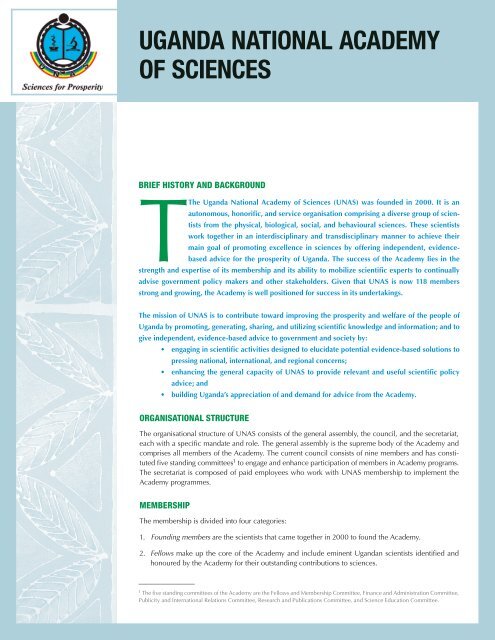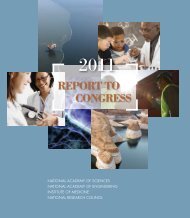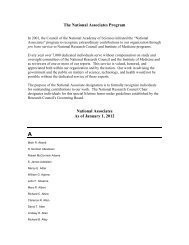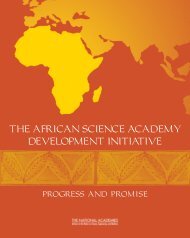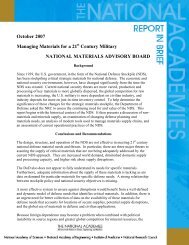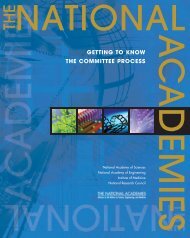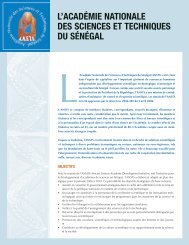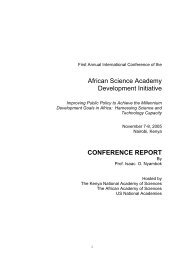UGANDA NATIONAL ACADEMY OF SCIENCES - National Academies
UGANDA NATIONAL ACADEMY OF SCIENCES - National Academies
UGANDA NATIONAL ACADEMY OF SCIENCES - National Academies
You also want an ePaper? Increase the reach of your titles
YUMPU automatically turns print PDFs into web optimized ePapers that Google loves.
Uganda <strong>National</strong> Academy<br />
of Sciences<br />
Brief History and Background<br />
TThe Uganda <strong>National</strong> Academy of Sciences (UNAS) was founded in 2000. It is an<br />
autonomous, honorific, and service organisation comprising a diverse group of scientists<br />
from the physical, biological, social, and behavioural sciences. These scientists<br />
work together in an interdisciplinary and transdisciplinary manner to achieve their<br />
main goal of promoting excellence in sciences by offering independent, evidencebased<br />
advice for the prosperity of Uganda. The success of the Academy lies in the<br />
strength and expertise of its membership and its ability to mobilize scientific experts to continually<br />
advise government policy makers and other stakeholders. Given that UNAS is now 118 members<br />
strong and growing, the Academy is well positioned for success in its undertakings.<br />
The mission of UNAS is to contribute toward improving the prosperity and welfare of the people of<br />
Uganda by promoting, generating, sharing, and utilizing scientific knowledge and information; and to<br />
give independent, evidence-based advice to government and society by:<br />
• engaging in scientific activities designed to elucidate potential evidence-based solutions to<br />
pressing national, international, and regional concerns;<br />
• enhancing the general capacity of UNAS to provide relevant and useful scientific policy<br />
advice; and<br />
• building Uganda’s appreciation of and demand for advice from the Academy.<br />
ORGANISATIONAL STRUCTURE<br />
The organisational structure of UNAS consists of the general assembly, the council, and the secretariat,<br />
each with a specific mandate and role. The general assembly is the supreme body of the Academy and<br />
comprises all members of the Academy. The current council consists of nine members and has constituted<br />
five standing committees 1 to engage and enhance participation of members in Academy programs.<br />
The secretariat is composed of paid employees who work with UNAS membership to implement the<br />
Academy programmes.<br />
MEMBERSHIP<br />
The membership is divided into four categories:<br />
1. Founding members are the scientists that came together in 2000 to found the Academy.<br />
2. Fellows make up the core of the Academy and include eminent Ugandan scientists identified and<br />
honoured by the Academy for their outstanding contributions to sciences.<br />
1 The five standing committees of the Academy are the Fellows and Membership Committee, Finance and Administration Committee,<br />
Publicity and International Relations Committee, Research and Publications Committee, and Science Education Committee.
3. Foreign fellows are elected from among distinguished scientists<br />
who are not citizens of Uganda, but who have made significant<br />
contributions in their respective fields of science.<br />
4. Honorary fellows are elected by the general assembly from among<br />
persons of eminence or highest standing in society who have made<br />
outstanding contributions to the objectives of the Academy.<br />
PARTNERSHIPS<br />
With its increasing membership and staff, UNAS has succeeded in<br />
forging strategic linkages with key national, regional, and international<br />
stakeholders. At the national level, UNAS is a partner with the<br />
Uganda <strong>National</strong> Council for Science and Technology (UNCST) in<br />
the implementation of the Millennium Science Initiative (MSI). In<br />
addition, the Academy is linked to several policy advisory activities<br />
that have engaged professional bodies, scientists, and researchers<br />
from various public and private institutions in the country. At the<br />
regional and international levels, the Academy is now affiliated with<br />
the following organisations: the InterAcademy Panel (IAP), a global<br />
network of science academies; the Network of <strong>Academies</strong> of Science<br />
in the Organisation of Islamic Countries (NASIC); the Academy<br />
of Sciences for the Developing World (TWAS); and the Network of<br />
African Science <strong>Academies</strong> (NASAC). Owing to these and other<br />
linkages, UNAS is now involved in a greater number of national and<br />
international activities. One key programme for the Academy is<br />
implementation of the African Science Academy Development Initiative<br />
(ASADI), which is a close collaboration between UNAS and<br />
the U.S. <strong>National</strong> <strong>Academies</strong>.<br />
African Science Academy Development Initiative<br />
The 10-year African Science Academy Development Initiative was<br />
inaugurated in 2004 and aims to foster a more evidence-based<br />
approach to health and development initiatives in African countries.<br />
It was envisaged that this would be done by strengthening the<br />
capacity of African science academies to provide independent, evidence-based<br />
advice to their governments. Facilitated by the U.S.<br />
<strong>National</strong> <strong>Academies</strong>, this funding has been instrumental in acquiring<br />
office premises and equipment, hiring and training staff, and<br />
implementing program activities that include consensus studies<br />
and convening activities.<br />
The vision of ASADI is to mobilize a nation’s expertise to provide—<br />
through apolitical, multidisciplinary, independent, consensus-based<br />
processes—authoritative advice on matters of science and technology.<br />
Under this initiative, it is also envisaged that academies will ultimately<br />
be regarded as trusted sources of credible scientific advice.<br />
Indeed, UNAS is becoming increasingly recognized as both an honorific<br />
and a service organization that can convene Uganda’s best and<br />
brightest minds and apply them to timely issues of national relevance.<br />
Policy makers and legislators are also now beginning to turn to the<br />
Academy for scholarly advice.<br />
STRATEGIC PLANNING<br />
UNAS recently developed a 5-year strategic plan, outlining the<br />
course through 2011 in which the Academy seeks to craft an<br />
organization that remains true to its purpose and values while<br />
being flexible, forward looking, and adaptive to new circumstances.<br />
The overarching aim of the next 5 years is to increase the<br />
impact of what the Academy does, shaping both ideas and actions<br />
through analysis, education, and advice to stakeholders, thereby<br />
influencing outcomes for improved delivery of evidence-based<br />
scientific advice.<br />
Five strategic areas were identified, and the Academy is committed<br />
to achieving impacts through the following strategic goals:<br />
1. Enhancing the general capacity of UNAS to provide relevant<br />
and useful policy advice and promoting excellence in sciences<br />
through capacity building through staff and membership training<br />
and popularizing sciences by promoting science education and<br />
rewarding successful scientists<br />
2. Building national appreciation and demand for advice from the<br />
Academy by engaging in a series of scientific activities designed<br />
to elucidate potential evidence-based solutions to pressing<br />
national concerns such as consensus and convening activities<br />
3. Raising the profile and visibility of UNAS through long-term partnerships<br />
such as the one with the U.S. <strong>National</strong> <strong>Academies</strong>, continued<br />
relationships with stakeholders, engaging in various policy<br />
advisory activities, and continued regional alliances through<br />
annual symposia<br />
4. Improving and diversifying the UNAS financial resource base<br />
through the development of fundraising skills to ensure that each<br />
advisory model developed can ultimately be supported by local<br />
and international resources<br />
5. Operationalising mechanisms for providing and disseminating<br />
evidence-based advice. This is being done through testing a<br />
variety of policy advisory models such as convening activities<br />
or policy studies or formal advisory activities, to match<br />
Uganda’s needs, resources, culture, and challenges. The Academy<br />
is also enhancing the relationship with the news media<br />
by providing training and other outreach activities on science<br />
writing and reporting
C U R R E N T A C T I V I T I E S<br />
Forum on Health and Nutrition<br />
Founded in 2005 under the African Science Academy Development<br />
Initiative (ASADI), the UNAS Forum on Health and Nutrition was<br />
established to provide a structured opportunity for stakeholder discussion<br />
and scrutiny of critical and possibly contentious scientific and<br />
policy issues of shared concern related to issues of health and nutrition<br />
in Uganda and throughout the world. Because of the unofficial<br />
nature of its deliberations coupled with the neutrality of UNAS, the<br />
forum is uniquely positioned to stimulate original thinking about new,<br />
as well as long-standing, problems in these areas.<br />
The forum aims to:<br />
• promote a regular and ongoing exchange of information and ideas<br />
about critical issues among policy makers, public- and privatesector<br />
leaders, individuals, and groups who shape and influence<br />
public policy and opinion;<br />
• clarify policy and research issues and identify options that require<br />
additional emphasis and research, and encourage further exploration<br />
in these areas;<br />
• inform public- and private-sector decision and policy makers on<br />
a number of issues related to health and nutrition in Uganda and<br />
worldwide; and<br />
• formulate priority and collaborative initiatives that require indepth<br />
exploration, review, and/or analysis of existing data and<br />
research, particularly in instances where new strategies are necessary<br />
to advance progress in health and nutrition.<br />
Activities of the forum ideally parallel the emerging and long-standing<br />
health challenges faced by Ugandan policy makers and other health<br />
officials. Through public debate and member consultation, the forum<br />
has been able to identify the most challenging and crosscutting of<br />
these issues:<br />
Partnering for Science in Uganda: Establishing the Forum on<br />
Health and Nutrition<br />
In November 2005, UNAS convened a stakeholders’ meeting in Kampala<br />
to accomplish two goals. One was to identify the most critical<br />
health issues in the country that could be subjected to closer scrutiny<br />
through the relevant Academy activities, and the other was to<br />
introduce the concept of a UNAS Forum on Health and Nutrition.<br />
The stakeholders overwhelmingly agreed that malaria was the single<br />
biggest health concern facing the country and also endorsed the first<br />
UNAS Forum on Health and Nutrition, a decision that was ratified by<br />
the UNAS council, which subsequently decided that the first forum<br />
workshop would address malaria. This decision was based on the<br />
strong reactions of their stakeholders and the Academy members’<br />
desire to assist the nation during this major health crisis. From this<br />
meeting, a report entitled Partnering for Science in Uganda: Establishing<br />
the Forum on Health and Nutrition was produced. This report<br />
captures the presentations from this workshop and explains that the<br />
forum is a type of convening activity that provides an ongoing mechanism<br />
for the Academy’s stakeholders (including government, industry,<br />
and academia) to gather on a regular basis to identify and discuss<br />
issues of mutual concern. Finally, this publication explores the role that<br />
UNAS can play in the health and development of Uganda and delves<br />
into the priority issues for the forum to tackle.<br />
Malaria Control and Prevention: Strategies and Policy Issues<br />
In September 2007, UNAS held a workshop on Malaria Control and<br />
Prevention: Strategies and Policy Issues. The findings of the workshop<br />
summary report served as the basis on which the UNAS executive<br />
council selected the topic for their first consensus study addressing<br />
malaria vector resistance to insecticides used for indoor residual spraying<br />
in Uganda. This workshop publication traces the process leading to<br />
the formation of UNAS’ Forum on Health and Nutrition, its composition,<br />
and the planning of the first forum workshop. It also provides a<br />
summary of the proceedings of the workshop itself. Finally, it contains<br />
papers that were presented at the workshop—papers that mainly highlight<br />
contentious issues in the fight against malaria in Uganda.<br />
Promoting Biosafety and Biosecurity Within the Life Sciences:<br />
An International Workshop in East Africa<br />
In March 2008, UNAS convened a workshop on the inadvertent or<br />
deliberate spread of disease stemming from life sciences research.<br />
The meeting, entitled Promoting Biosafety and Biosecurity Within<br />
the Life Sciences: An International Workshop in East Africa, gathered<br />
international and local experts on biosafety and biosecurity, Academy<br />
members, and policy makers for discussions of policy responses and<br />
practical institutional measures.<br />
Cofunded by the Alfred P. Sloan Foundation, this meeting demonstrated<br />
the UNAS’ ability to secure matching funding for its program activities.<br />
In addition to the funding provided by the Sloan Foundation and<br />
ASADI, UNAS secured support for the workshop participants’ travel<br />
from other government and private agencies, including Sandia <strong>National</strong><br />
Laboratories, Pacific Northwest <strong>National</strong> Laboratory, the Academy of<br />
Science of South Africa, the University of Maryland, and the InterAcademy<br />
Panel Working Group on Biosecurity.<br />
International Workshop on Managing and Sustaining Biocontainment<br />
Laboratories in Africa (January 2009)<br />
In July 2008, UNAS held a planning meeting meant to elucidate issues<br />
with regard to laboratory biocontainment and thus guide the selection<br />
of topics for the workshop to be held in January 2009. Some of the<br />
outstanding issues from this planning meeting included enforcement,<br />
regulatory frameworks, monitoring and evaluation functions, good<br />
laboratory practices/quality-control issues, maintaining and supporting<br />
the available labs at lower levels, and the need for biosecurity level<br />
4 labs due to the various disease outbreaks such as Ebola. Specifically,<br />
it was suggested that topics for the January 2009 workshop on planning,<br />
managing, and sustaining biocontainment laboratories in Africa<br />
should include, among others, a situation analysis of laboratories in
Uganda, specific dangers originating from pathogens, laboratory<br />
quality management, laboratory quality principles and certification<br />
requirements, and general government policies and regulatory frameworks.<br />
As a way of preparing for the January 2009 workshop, it was<br />
agreed that UNAS should have access to procedures for lab certification,<br />
it needs to bring all key stakeholders on board, and it must<br />
ensure that an evaluation report of the status of laboratories in Uganda<br />
is part of the agenda.<br />
International Workshop on Quality of Care Issues For Mental<br />
Health and Neurological Disorders in sub-Saharan Africa<br />
(August 2009)<br />
An International Workshop on Quality of Care Issues for Mental<br />
Health and Neurological Disorders in sub-Saharan Africa is planned<br />
to take place in Kampala in August 2009. This workshop will be a joint<br />
forum workshop by the UNAS Forum on Health and Nutrition and<br />
the US-NAS Neuroscience and Nervous System Disorders Forum.<br />
A planning meeting was held in Kampala on 16 July 2008. The aim<br />
of this planning meeting was to inform the two forums on the most<br />
critical issues concerning quality of care for mental health and neurological<br />
disorders in sub-Saharan Africa so as to guide the agenda<br />
of the August 2009 meeting. Issues that emerged from this meeting<br />
included the need to focus on policy issues and issues on neurology,<br />
drug abuse, and stigmatization. Lack of human and financial<br />
resources is also considered to be a challenge. The discussion at the<br />
meeting revealed the poor quality of the referral system and services<br />
for mental health and neurological disorder patients, that there is evident<br />
a lack of human resources, that stakeholders (users of services)<br />
are isolated in decision making, and that there is a need for a model of<br />
service delivery, information sharing, and resource allocation, among<br />
others. Potential topics for the August 2009 workshop were listed<br />
and discussed by the Africa-U.S. working group in anticipation of the<br />
September 2008 planning meeting in Washington, DC, that will help<br />
build the agenda for the August 2009 workshop.<br />
Consensus Studies<br />
Consensus studies are advisory models that UNAS is using to advise<br />
government by providing scientific evidence to help policy making.<br />
Consensus-based policy studies are in-depth analyses conducted<br />
by a committee of experts on subjects selected by the Academy in<br />
consultation with the stakeholders. Careful procedures are used for<br />
selecting members to the committee to best ensure that the committee’s<br />
experience and expertise are appropriate to the task, and that<br />
financial or other interests that might interfere with members’ ability<br />
to serve objectively are addressed. The goal is to appoint a committee<br />
that is free from bias and conflicts of interest and works together<br />
to achieve consensus in order to provide the specific policy guidance<br />
requested.<br />
Malaria Mosquito Alert: Approaches to Assessing and Managing<br />
Malaria Vector Resistance to Insecticides Used for IRS in<br />
Uganda—Contributing to a <strong>National</strong> IRS Strategy<br />
When the Ministry of Health in Uganda embarked on the programme<br />
of indoor residual spraying (IRS) as one of the major strategies to<br />
combat mosquitoes that spread malaria (the country’s leading cause<br />
of death), stakeholders asked UNAS to convene an expert committee<br />
to help foster a successful implementation strategy for IRS in<br />
the country. The committee consisted of experts from diverse fields<br />
including epidemiology, public health policy, entomology, medicine,<br />
health economics, and public health—independent experts<br />
whose selection was based on their individual expertise (they did<br />
not represent the organisations they work for), free from intractable<br />
bias and conflicts of interest. The committee was presented with a<br />
statement of task (“the charge”) agreed upon by the donor and was<br />
expected to provide responses to it. To appropriately and successfully<br />
respond to the charge presented to it, the committee analysed<br />
data from a variety of sources (including scientific literature and testimony<br />
from experts on the topic and the general public) before drafting<br />
recommendations that were later peer reviewed for accuracy<br />
and appropriateness The result of this rigorous Academy process is<br />
UNAS’ first-ever consensus study report entitled Malaria Mosquito<br />
Alert: Approaches to Assessing and Managing Malaria Vector<br />
Resistance to Insecticides Used for IRS in Uganda—Contributing<br />
to a <strong>National</strong> IRS Strategy. It contains the committee’s conclusions,<br />
recommendations, and supporting text. The report says that as the<br />
spraying continues, the Ministry of Health needs to monitor mosquitoes<br />
for resistance to insecticides, and manage the spraying programme<br />
in ways that minimize resistance. The report was launched<br />
on the 20 June 2008 in Kampala. The launch attracted scientists,<br />
government officials, and the media. Prior to the launch, the committee<br />
gave a special briefing (focusing on the key conclusions and<br />
recommendations) to the Ministry of Health as the principal consumers<br />
of the report. Overall, this report was well received by the<br />
government and received media coverage from the two major print<br />
media houses (New Vision, which is government owned, and The<br />
Daily Monitor, which is independent). It also received coverage in<br />
the international media.<br />
Science Education<br />
Science education is a national priority, and UNAS is actively engaged<br />
in science education programs at both the national and international<br />
levels. Through the years the Academy has worked in<br />
collaboration with the InterAcademy Panel to promote science education<br />
in Uganda. The international Workshop on Inquiry-Based<br />
Science Education was hosted by UNAS in Kampala in 2005 and<br />
produced proceedings entitled “Best Practices in Sciences Education.”<br />
Currently, UNAS is the lead Academy for Anglophone Africa<br />
Science Education Programs and is implementing a project with<br />
support from the InterAcademy Panel. The project commenced in<br />
May 2008, and UNAS is the lead implementer working in collaboration<br />
with the <strong>National</strong> <strong>Academies</strong> of Kenya, Senegal, and South<br />
Africa, and the Network of African Science <strong>Academies</strong> to execute<br />
planned activities.<br />
MP/Scientists Pairing Scheme (Pilot)<br />
Together with the Parliament of Uganda, UNAS is running a pilot<br />
scheme that aims to pair up Ugandan scientists and members of<br />
parliament (MPs) who would like to learn more about each other’s
work. The scheme is based on a successful and unique project that<br />
has been running in the U.K. for 7 years and which is managed by<br />
the Royal Society in London. The Ugandan project is being supported<br />
by the Royal Society and the U.K.’s Parliamentary Office for<br />
Science and Technology (through a charitable grant from the Gatsby<br />
Foundation).<br />
The key objectives of this scheme are:<br />
• to help scientists recognize the potential methods and structures<br />
through which they can feed their scientific knowledge to parliamentarians<br />
and the government of Uganda;<br />
• to provide an opportunity for MPs to forge direct links with a<br />
network of practicing research scientists;<br />
• to give MPs the opportunity to familiarize themselves with the<br />
process of scientific understanding and topical research and<br />
ultimately bring this new knowledge into better informed discussions<br />
and policy decisions; and<br />
• to help practicing scientists understand the pressures under<br />
which MPs operate.<br />
Baseline Study: The Role of Science and<br />
Technology in Evidence-Based Scrutiny of<br />
Government by the Parliament of Uganda<br />
UNAS, in collaboration with the Parliament of Uganda and the U.K.<br />
Parliamentary Office of Science and Technology, is conducting a<br />
baseline study on “The Role of Science and Technology in Evidence-<br />
Based Scrutiny of Government by the Parliament of Uganda.” This<br />
activity is part of a wider programme of activities to strengthen<br />
evidence-based scrutiny of government by the Parliament of Uganda.<br />
The primary aims of the baseline study are:<br />
• to establish benchmarks for describing how effectively the Parliament<br />
of Uganda currently deals with science and technology<br />
issues, and<br />
• to identify gaps and enhance handling of science and technology<br />
issues by the Parliament of Uganda.<br />
Research, Academia, and Science (RAS)<br />
Self-Coordinating Entity of the Uganda<br />
AIDS Partnership<br />
A C A D E M Y L E A D E R S H I P<br />
Council Members<br />
PR<strong>OF</strong>. PAUL E. MUGAMBI<br />
(President)<br />
Retired Professor of Mathematics,<br />
Makerere University and Acting Vice-Chancellor<br />
Nkumba University<br />
PR<strong>OF</strong>. ELLY N. SABIITI<br />
(Vice-President)<br />
Professor of Agronomy, Department of Crop Science,<br />
Faculty of Agriculture, Makerere University<br />
DR. A. M. S. KATAHOIRE<br />
(Treasurer)<br />
Managing Partner/Principal Consulting Engineer,<br />
Multi-Konsults Consulting Engineers and<br />
Technical Planners<br />
PR<strong>OF</strong>. EDWARD K. KIRUMIRA<br />
Chair, UNAS Forum on Health and Nutrition,<br />
Dean, Faculty of Social Sciences, Makerere University<br />
DR. FINA A. OPIO<br />
Program Manager, Staple Crops, Association for<br />
Strengthening Agricultural Research in East and<br />
Central Africa<br />
HON. DR. HAM-MUKASA MULIRA<br />
Ministry of ICT, Government of Uganda<br />
PR<strong>OF</strong>. WILLIAM B. BANAGE<br />
Retired Professor of Zoology, Makerere University<br />
DR. MARGARET SAIMO KAHWA<br />
Senior Lecturer, Faculty of Veterinary Medicine,<br />
Makerere University<br />
PR<strong>OF</strong>. PATRICK R. RUBAIHAYO<br />
Professor Emeritus, Department of Crop Science,<br />
Faculty of Agriculture, Makerere University<br />
RAS is one of the self-coordinating entities of the Uganda AIDS<br />
Commission (UAC). The Academy is the focal point for RAS and<br />
has played a key role in collaboration with other stakeholders to<br />
design a national research agenda for HIV/AIDS. In partnership with<br />
the UAC, the Academy (representing RAS) is one of the major stakeholders<br />
in designing and implementing the “Long-Term Institutional<br />
Arrangements for Management and Coordination of Global Health<br />
Grants in Uganda.”
UNAS PUBLICATIONS<br />
Uganda <strong>National</strong> Academy of Sciences. 2006. Partnering for Science in Uganda:<br />
Establishing the Forum on Health and Nutrition.<br />
Uganda <strong>National</strong> Academy of Sciences. 2007. Malaria Control and Prevention:<br />
Strategies and Policy Issues.<br />
Available at: www.ugandanationalacademy.org<br />
Uganda <strong>National</strong> Academy of Sciences. 2008. Mosquito Alert: Approaches<br />
to Assessing and Managing Malaria Vector Resistance to Insecticides Used for<br />
Indoor Residual Spraying in Uganda—A Contribution to a <strong>National</strong> Indoor Residual<br />
Spraying Strategy.<br />
Available at: www.ugandanationalacademy.org<br />
Uganda <strong>National</strong> Academy of Sciences and Research, Academia, and Science<br />
Self-Coordinating Entity of Uganda AIDS Commission. 2008. Major HIV/AIDS<br />
research institutions/programs, researchers, and research areas.<br />
CONTACT INFORMATION<br />
The Secretariat<br />
Uganda <strong>National</strong> Academy of Sciences<br />
Flat A4 Lincoln Flats<br />
Makerere University Main Campus<br />
Kampala, Uganda<br />
Telephone: +256 414 533 0444<br />
Fax: +256 414 533 044<br />
Website: http://www.ugandanationalacademy.org<br />
E-mail: unas@infocom.co.ug<br />
Support for this publication was provided by the Presidents’ Circle<br />
Communications Initiative of the U.S. <strong>National</strong> <strong>Academies</strong>.


